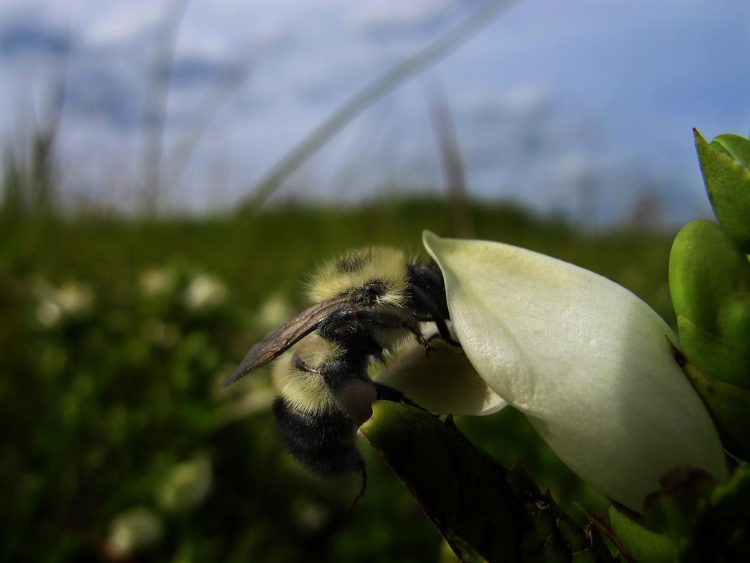Bee disease reduced by nature's 'medicine cabinet,' Dartmouth-led study finds

A bumble bee collecting nectar containing iridoid glycoside secondary metabolites from a turtlehead flower. Credit: Leif Richardson
The researchers found that chemicals in floral nectar, including the alkaloids anabasine and nicotine, the iridoid glycoside catalpol and the terpenoid thymol, significantly reduce parasite infection in bees.
The results suggest that growing plants high in these compounds around farm fields could create a natural “medicine cabinet” that improves survival of diseased bees and pollination of crops.
The researchers studied parasite infections in bumble bees, which like honey bees are important pollinators that are in decline around the world, a trend that threatens fruits, vegetables and other crops that make up much of the food supply for people.
The findings appear in the journal Proceedings of the Royal Society B. A PDF of the study and photos of bees are available on request. The study included researchers from Dartmouth and the University of Massachusetts-Amherst
Plants produce chemicals called secondary metabolites to defend leaves against herbivores. These chemicals are also found in nectar for pollinators, but little is known about the impacts of nectar chemistry on pollinators, including bees.
The researchers hypothesized that some nectar compounds could reduce parasite infections in bees, so they inoculated individual bumble bees with an intestinal parasite and tested effects of eight naturally occurring nectar chemicals on parasite population growth.
The results showed that consumption of these chemicals lessened the intensity of infection by up to 81 percent, which could significantly reduce the spread of parasites within and between bee colonies.
“Our novel results highlight that secondary metabolites in floral nectar may play a vital role in reducing bee-parasite interactions,” says senior author Dartmouth Professor Rebecca Irwin.
###
Available to comment are:
Dartmouth Professor Rebecca Irwin at Rebecca.E.Irwin@dartmouth.edu
Lead author Leif Richardson, a postdoctoral research fellow at the University of Vermont who recently received his PhD from Dartmouth's Department of Biological Sciences, at leif.richardson@uvm.edu
Broadcast studios: Dartmouth has TV and radio studios available for interviews. For more information, visit: http://www.
Media Contact
All latest news from the category: Life Sciences and Chemistry
Articles and reports from the Life Sciences and chemistry area deal with applied and basic research into modern biology, chemistry and human medicine.
Valuable information can be found on a range of life sciences fields including bacteriology, biochemistry, bionics, bioinformatics, biophysics, biotechnology, genetics, geobotany, human biology, marine biology, microbiology, molecular biology, cellular biology, zoology, bioinorganic chemistry, microchemistry and environmental chemistry.
Newest articles

Sea slugs inspire highly stretchable biomedical sensor
USC Viterbi School of Engineering researcher Hangbo Zhao presents findings on highly stretchable and customizable microneedles for application in fields including neuroscience, tissue engineering, and wearable bioelectronics. The revolution in…

Twisting and binding matter waves with photons in a cavity
Precisely measuring the energy states of individual atoms has been a historical challenge for physicists due to atomic recoil. When an atom interacts with a photon, the atom “recoils” in…

Nanotubes, nanoparticles, and antibodies detect tiny amounts of fentanyl
New sensor is six orders of magnitude more sensitive than the next best thing. A research team at Pitt led by Alexander Star, a chemistry professor in the Kenneth P. Dietrich…





















